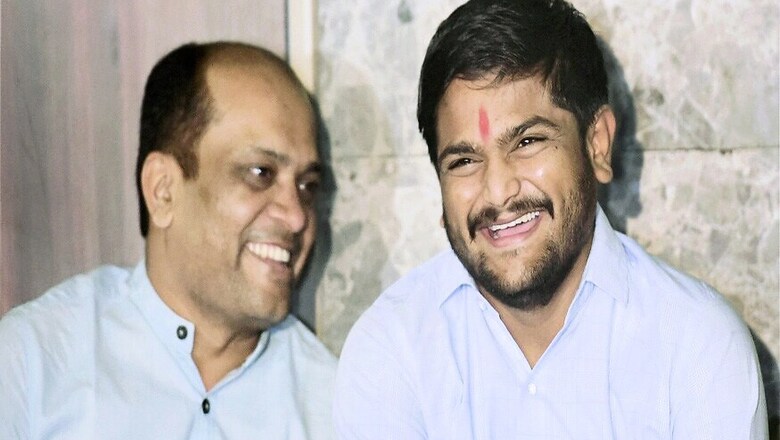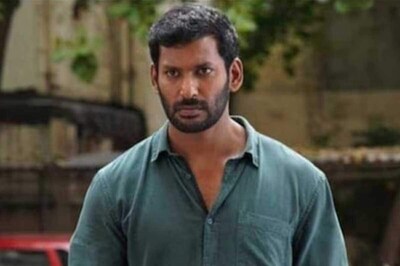
views
New Delhi: Constitutional experts have dismissed the Congress proposal of giving reservation to Patidars under Article 46 of the Constitution as an election gimmick that would not pass judicial scrutiny.
Patidar Anamat Andolan Samiti (PAAS) leader Hardik Patel on Wednesday said that Congress has agreed to give Patidars reservation that would be “parallel to OBCs under Article 46”. The article will be read with Article 31 C to bring in a Bill for non-reserved classes, he said. Congress leader Kapil Sibal, a senior lawyer, said it was a “well thought process.”
Article 46 allows the promotion of educational and economic interests of Scheduled Castes, Scheduled Tribes and other weaker sections. But there exists no material to show Patels are educationally and socially backward. Besides, reservation on purely economic grounds is not permitted under the Constitution.
Justice BN Srikrishna, a former judge of the Supreme Court, told News18 that even if the Congress plans to put this reservation law in the ninth schedule, it would not be able to evade judicial review.
“In Koyla’s case, the Supreme Court has held that just because a law is put in the ninth schedule it is not immune from scrutiny. It has to stand the test of Article 14 and Article 19 of the Constitution. Saying this for election purpose is good but it may not stand the actual test of scrutiny,” he said.
Hardik Patel has insisted that the quota bid does not impinge on the current 49 per cent reservations for the SC, ST and OBC groups in Gujarat. But the primary roadblock for the reservation law would be the 50 per cent cap set by the apex court in a 1992 judgment in Indra Sawhney vs Union of India and Others.
Constitutional expert and former Lok Sabha secretary general, Dr Subhash Kashyap, said that such a law was only political parties playing to the gallery as the courts have always been against raising the cap.
“I don’t see this as possible. Article 46 is not an enforceable right and a mere guideline for the legislature. Any such legislation is for judicial review and courts have been always against increasing the ceiling of reservation going above the 50 per cent cap,” he said.
Kashyap said it was different for Tamil Nadu because even before the Constitution, the reservation quota was at 69 per cent and the legislation allowing that was inserted in the ninth schedule. “I do not think today any reservation on any ground other than SC, ST can be granted,” he added.
If judicial precedents were to be considered, courts have been reluctant to extend the 50 per cent cap on several occasions.
In 2008, the apex court reiterated the ruling in Indra Sawhney (I) (Mandal case) that the total reservation for SC/ST and other backward classes or special categories should not exceed 50 per cent.
The Gujarat government had also passed an ordinance declaring additional 10% quota for economically backward classes among the higher castes in May last year, but the high court stuck it down, calling it unconstitutional.
The Bombay HC in 2015 also stayed Maharashtra government’s decision on Maratha reservation and held that the community cannot be regarded as backward class.
In November last year, the Supreme Court again observed that ceiling of 50 per cent reservation could not be breached while hearing a case on giving quota to Gujjars and other communities under OBC category in Rajasthan.
Alok Prasanna Kumar, senior resident fellow at Vidhi Centre for Legal Policy, said that if Patidars have to be given reservation, then the judgment in Indira Sawhney case would have to be re-examined and the “cap must go.”
“There is no fool proof way of giving reservations. The Congress will have to come out and say one of two things. Either the SC's 50% cap will have to be re-examined, or reservations will be for anyone and everyone. SC will have to be asked to relook its judgment in Indra Sawhney totally if reservations have to be given to Patidars.”
“There's no constitutional basis to give Patidars reservations,” Kumar told News18. He added that even if the 50 per cent cap is removed, reservations are not scholarships to be given out to anyone who wants it. “It's a tool for social reform which cannot be re-purposed by upper castes to retain dominant positions in society.”




















Comments
0 comment